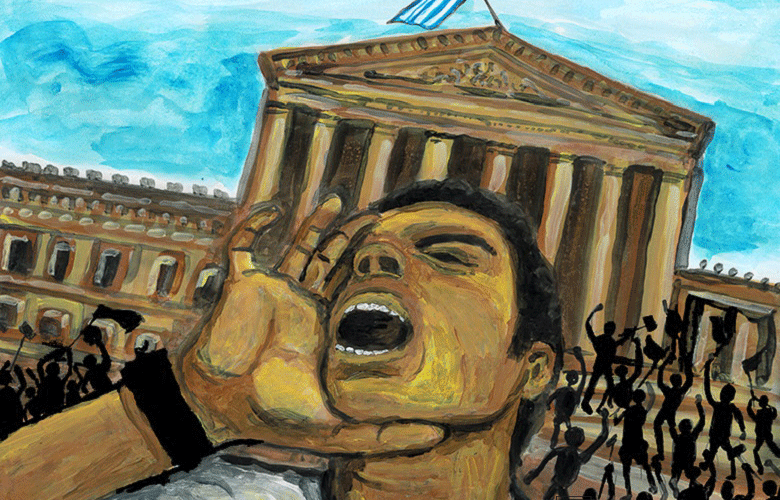From Director’s Desk
Written By : Jayanta Chakrabarty
Multidimension
Illustration : Avijit Ghosh
On the other side of Sea, in Europe, another scenario had already unraveled.
The overall suicide rate in Greece rose by 35% between 2011 to 2012. The suicide mortality rate for men increased from 5.75 (2003–2010) to 7.43 per 100 000 population during this period, i,e, 2 in a day. Experts attributed the rise to the country’s economic crisis.
The dream of the Euro as a strong currency was dented.
The Greek economy was one of the Eurozone’s fastest growing from 2000 to 2007, averaging 4.2% annually, as foreign capital flooded in. This capital inflow coincided with a higher budget deficit.
Trade deficit and budget deficit rose from below 5% of GDP in 1999 to peak around 15% of GDP in the 2008–2009 periods.
As the Great Recession spread to Europe, the amount of funds lent from the rich European countries like Germany to the peripheral countries such as Greece began to decline.
Several other Eurozone member states, such as Portugal, Ireland, Spain and Cyprus were unable to repay or refinance their government debt or to bail out over-indebted banks under their national supervision without the assistance of third parties like other Eurozone countries, the European Central Bank, IMF or World Bank (TROIKA).
The successive governments of Greece succumbed to the pressure of the Troika, cutting drastically the public spending on social welfare programs and privatization.
Greek wages fell nearly 20% from mid-2010 to 2014. Unemployment reached nearly 25%, from below 10% in 2003, which triggered local riots and nationwide protests.
Those who were super rich became richer.
The Capitalism used its own crisis to indulge a new politics, finding the scapegoats, triggering the war between the middle class and the poor.
The country saw the rise of extreme right-wing party and incidents of attack on the immigrant population.
Heroes and A Tale of Migration – Part 1
Heroes and A Tale of Migration- Part 2
Heroes and A Tale of Migration – Part 4
On the other part of the world
The Syrian crisis deepened further with a number of countries in the region and western powers got involved in the multitude of interests in the disguise of promoting democracy and the fall of the dictatorial regime of Asad. The United States, France and the United Kingdom took up their holy fight of democracy, supporting the rebels alongside Saudi Arabia, Qatar and Turkey.
In fact, the world had already witnessed the result of the adventure of Western powers to promote its democratic ideas in Iraq, overthrowing Saddam Hussein in 2003, thus plunging the country and the whole region into chaos.
The old day-to-day enemy Al-Qaida transformed into a much bigger threat taking advantage of the void, with the arrival of Islamic State in Iraq and the Levant (ISIL).
In January 2014, ISIL took control of the vast part of Western Iraq, pushing with the Iraqi Army on the back foot. On 4 June, the insurgents began their efforts to capture Mosul, the second biggest city after Baghdad. After six days of fighting, the city fell under ISIL’s control. An estimated 500,000 civilians fled from the city, due to the conflict.
The group proclaimed itself a Caliphate and began referring to itself as the Islamic State in June 2014. As a caliphate, it claims religious, political and military authority over all Muslims worldwide.
ISIS took control of vast of territories in Iraq and Syria. The group successfully promoted its image and sold the dream of a paradisiacal version of Islam to the disenchanted youth of the immigrant population from the European countries like Belgium, Britain and France. They joined in numbers to sacrifice their lives for fighting the Jihad, and a certain number of them are women.
As the Middle East turned into a dubious ground of revolution for democracy by the year of 2014, the civil war in Mali had taken a different shape. The Islamists were defeated and pushed back. A peace deal between the government and Tuareg rebels was signed on 18 June 2013. But the MNLA ended the ceasefire in September as the government forces opened fire on unarmed protesters. On 20 February 2014, Germany and France announced the shipment of elements of the Franco-German brigade to Mali to help train Mali troops. This is the first deployment of EU troops in Africa.
During this time, our present-day hero Mamoudou Gassama crossed the Mediterranean Sea to set his feet in Europe, the dream continent, where his elder brother arrived many years back and attained the success.
Then, what shall we call his migration, political or economic?




